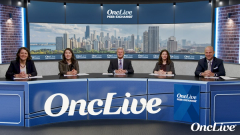
Opinion|Videos|July 8, 2024
Advancing Treatment for EGFR-Mutant Advanced NSCLC: Lessons from FLAURA2
Helena A. Yu, MD, discusses her treatment strategy for patients with EGFR-mutant non-small cell lung cancer (NSCLC), emphasizing current guidelines and standard of care, while Zosia Piotrowska, MD, MHS, examines the key efficacy and safety findings from the FLAURA2 study, which evaluated first-line osimertinib combined with chemotherapy in patients with advanced EGFR-mutant NSCLC.
Advertisement
Episodes in this series

- Briefly discuss your general treatment approach in patients with EGFR-mutant NSCLC.
- What treatment options are available? What is the standard of care in this setting?
- What factors do you consider in guiding treatment selection?
- Please review key efficacy and safety data from FLAURA2 evaluating 1L osimertinib with chemotherapy in patients with EGFR-mutant advanced NSCLC.(
Janne, et al. WCLC 2023. Abstract PL03.13 ;Planchard, et al. ESMO 2023. Abstract LBA68 )- What implications may these findings have on clinical practice?
Advertisement
Latest CME
Advertisement
Advertisement
Trending on OncLive
1
Long-Term Cilta-Cel Data Show Low Rates of PFS Events in Standard-Risk R/R Myeloma
2
Nonresponse to Bridging Therapy and Peak ALC After Cilta-Cel Are Associated With Neurotoxicity, NRM in Myeloma
3
FDA Underscores Risks Associated With DPD Deficiency and Capecitabine/5-FU Use in Cancer Care
4
FDA Updates Axi-Cel Label to Remove Limitation of Use in R/R PCNSL
5



































